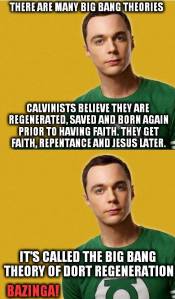He that COMETH to God must BELIEVE that he is – Hebr. 11:16
 But without FAITH it is impossible to please him: for he that COMETH to God must believe that he is, and that he is a rewarder of them that diligently seek him. Hebrews 11:6
But without FAITH it is impossible to please him: for he that COMETH to God must believe that he is, and that he is a rewarder of them that diligently seek him. Hebrews 11:6
It is rather clear that God requires us to have faith in him and believe in him before we come to him (we would not come to him unless we believed in him). We must carry faith/belief with us when we come. Calvinists, however, believe in Total inability (as in T in TULIP), so they believe that all people are born with a natural inability to believe in God, and that God consequently must “open their eyes” in order to make them believe. This results in God actually choosing whom to save and whom to damn (before we are even born), because God does not enable all to believe in him. Hebr. 11:6 does not suggest that God starts out making some of us believe. It is rather we who must make sure to believe and come to him. If we do, we have wonderful things in store for us! The Bible does not teach anything close to Calvinism. We are ALL given light when we come into this world and we are requested to believe and to follow him in order to not walk in darkness:
John. 1:4 In him was life; and the life was THE LIGHT OF MEN.—9 That was the true Light, WHICH LIGHTETH EVERY MAN THAT COMETH INTO THE WORLD.10 He was in the world, and the world was made by him, and the world knew him not.11 He came unto his own, and his own received him not.12 But AS MANY AS RECEIVED HIM, TO THEM GAVE HE THE POWER TO BECOME THE SONS OF GOD, even to them that BELIEVE on his name
John 9:5 As long as I am in the world, I am THE LIGHT OF THE WORLD.
John 12:46 I am come a light into the world, that WHOSOEVER BELIEVETH ON ME should not abide in darkness.
John 8:12 Then spake Jesus again unto them, saying, I am the light OF THE WORLD: he that FOLLOWETH ME shall not walk in darkness, but shall have the light of life.
John 3:21 But he that DOETH truth cometh to the light, that his deeds may be made manifest, that they are wrought in God.
2 Cor. 4:4 In whom the god of this world hath blinded the minds of them WHICH BELIEVE NOT, lest the light of the glorious gospel of Christ, who is the image of God, should shine unto them.
Notice above that God chooses to blind the minds of them WHICH BELIEVE NOT. That is a similar story as in Rom. 1:18-32, where God in v. 28 is told to give people up to a reprobate mind because of their refusal to retain God in their knowledge.
Pay special attention to John 1:12 which says:
“But AS MANY AS RECEIVED HIM, TO THEM GAVE HE THE POWER TO BECOME THE SONS OF GOD, even to them that BELIEVE on his name”
The order of events is 1) believe/receive him, leading to 2) becoming the sons of God. Not the other way around.
People who COME must believe, and they might not always DO the things of God or remain with him
Jesus asks:
Luke 6:46 And why call ye me, Lord, Lord, and DO NOT the things which I say?
According to Calvinism I thought it was not even possible to NOT do the things which the Lord says? So why does Jesus imply that it is possible to act contrary to his requests? He continues:
47 Whosoever cometh to me, and heareth my sayings, and DOETH them, I will shew you to whom he is like: 48 He is like a man which built an house, and digged deep, and laid the foundation on a rock: and when the flood arose, the stream beat vehemently upon that house, and could not shake it: for it was founded upon a rock.49 But he that heareth, and DOETH NOT, is like a man that without a foundation built an house upon the earth; against which the stream did beat vehemently, and immediately it fell; and the ruin of that house was great.
I thought all people everywhere always did the sayings of the Lord? Yet here we can see that some people COME to the Lord, HEAR his sayings and yet choose to NOT do the sayings of the Lord. It certainly does not seem like we always act as God would want us to act. The blame for “not doing” is further on man and not on God. Notice that the parable is about men who builds something – their own houses – which means that their own choice of building construction will depend on
Ja. 1:22 But be ye doers of the word, and not hearers only, deceiving your own selves.
John 6:35 And Jesus said unto them, I am the bread of life: he that cometh to me shall never hunger; and he that believeth on me shall never thirst.–40 And this is the will of him that sent me, that every one which seeth the Son, and BELIEVETH ON HIM, may have everlasting life: and I will raise him up at the last day.—51 I am the living bread which came down from heaven: if ANY MAN EAT of this bread, he shall live for ever: and the bread that I will give is my flesh, which I will give for the life of the world.
Luke 9:23 And he said to them all, If any man will come after me, let him deny himself, and take up his cross daily, and follow me.24 For whosoever will save his life shall lose it: but whosoever will lose his life for my sake, the same shall save it.25 For what is a man advantaged, if he gain the whole world, and lose himself, or be cast away?26 For whosoever shall be ashamed of me and of my words, of him shall the Son of man be ashamed, when he shall come in his own glory, and in his Father’s, and of the holy angels.
Parable of the great banquet – where people are requested to COME and yet they do not
Below we can see that the Master of the house asked his servant to go out and bid many to a great supper. The servant was asked to say to those who were bidden to “COME, for all things are now ready”. The Master in this parable could be likened to God the Father, and as we can see in the parable people who were initially invited to come found excuses for not coming!
The servant was then asked to “bring in hither the poor, and the maimed, and the halt, and the blind”, which is something the servant had already done. It seems like these groups of people (rather unfortunate people here on earth due to their poverty and physical shortcomings) had an advantage here because they were singled out as specifically welcomed, but we are not told that every single one of them chose to come. Just that there was still room left also after these groups had been invited. (The case could also be that people who are poor and maimed have a higher tendency to seek God compared to people who have always lived in comfort and luxury.)
The Master became ANGRY when those who were initially bidden declined to come. The blame for not coming must be placed on them and not on the Master (God) because the Master truly wanted all invited to come – yet they did not. The Master said of those who declined to come: “none of those men which were bidden shall taste of my supper”.
Luke 14:16 Then said he unto him, A certain man made a great supper, and bade many:17 And sent his servant at supper time to say to them that were bidden, Come; for all things are now ready.18 And they all with one consent began to make excuse. The first said unto him, I have bought a piece of ground, and I must needs go and see it: I pray thee have me excused.19 And another said, I have bought five yoke of oxen, and I go to prove them: I pray thee have me excused.20 And another said, I have married a wife, and therefore I cannot come.21 So that servant came, and shewed his lord these things. Then the master of the house being angry said to his servant, Go out quickly into the streets and lanes of the city, and bring in hither the poor, and the maimed, and the halt, and the blind.22 And the servant said, Lord, it is done as thou hast commanded, and yet there is room.23 And the lord said unto the servant, Go out into the highways and hedges, and compel them to come in, that my house may be filled.24 For I say unto you, That none of those men which were bidden shall taste of my supper.
After having told the parable, Jesus continues to explain that if we do come to him we must “hate” our father and mother, which means that we should not act like the unwise people in the parable who offered up various excuses for not coming to the Supper, such as marriage, when they were compelled to come. Nothing should prevent us from coming to God if he calls us! Not even if it is about our father and mother. Naturally marriages, parents, newly bought land, etc are important matters, but compared to God and his calling we must still prioritize correctly and place all other things in second place. A condition for being a disciple is to bear our cross and follow Jesus. He does not say that he will do this for us and instead of us so that we will not have to.
He goes on to explain that it is our job to count the cost before we choose to come! Do we have sufficient motivation to be his disciples? Will we be able to love God before anything/anyone else and carry our cross? If not, coming to Jesus will not save us if we are not prepared to forsake other things which might be in the way when we become his disciples. We must be eager to follow him and obey his commandments, which will truly show that we love him. It might seem like a difficult task, but we are not asked to cease living in this world or to avoid having families and possessions. We are just asked to be prepared to place God before anything else – and if we love him we obey him. The holy Spirit is our helper! Salt is good but even salt can lose its’ savor, which indicates that we are not unconditionally saved:
26 If any man come to me, and hate not his father, and mother, and wife, and children, and brethren, and sisters, yea, and his own life also, he cannot be my disciple.27 And whosoever doth not bear his cross, and come after me, cannot be my disciple.28 For which of you, intending to build a tower, sitteth not down first, and counteth the cost, whether he have sufficient to finish it?29 Lest haply, after he hath laid the foundation, and is not able to finish it, all that behold it begin to mock him,30 Saying, This man began to build, and was not able to finish.31 Or what king, going to make war against another king, sitteth not down first, and consulteth whether he be able with ten thousand to meet him that cometh against him with twenty thousand?32 Or else, while the other is yet a great way off, he sendeth an ambassage, and desireth conditions of peace.33 So likewise, whosoever he be of you that forsaketh not all that he hath, he cannot be my disciple.34 Salt is good: but if the salt have lost his savour, wherewith shall it be seasoned?35 It is neither fit for the land, nor yet for the dunghill; but men cast it out. He that hath ears to hear, let him hear.
Parable of the wedding banquet – where people on the wedding invitation refuse to come
There is one verse in the below parable which Calvinists often quote, and that is “For many are called, but few are chosen”. This verse read in a vacuum might sound like God is the one choosing whom to save, but not only does the verse not say this, but the context shows that those who are called “chosen” are those who accept to come to the King’s wedding feast for his son! This means that we can all end up in the great wedding feast if we choose to accept the invitation and also make sure to show up – dressed in proper clothes. It is our responsibility to go to the party that we have been invited to, and if we decline and/or do not show up it is our fault and certainly not God’s fault for not “choosing” us. We can all be among the chosen, and God should not be blamed if we find ourselves on the outside.
Let us also remember that Israel was “chosen”, but not all Israel will be saved. When we read about groups of people or individuals being “chosen”, it does not necessarily mean “chosen to believe”. In fact, there is not one such case in the Bible. This parable clearly shows that many people who had their names on the guest list for the wedding feast chose not to come, even though the King expected them to come and was angry when they gave excuses for not coming! God would want all people to be saved, but man has a free will and is responsible for his own decisions and actions. Good and bad people are invited to come, which means that also unrighteous people have a chance to enter the kingdom of God. The condition, however, is repentance in order to be forgiven and cleansed, and if we repent we will also get the proper wedding garments.
Matt. 22:1 And Jesus answered and spake unto them again by parables, and said,2 The kingdom of heaven is like unto a certain king, which made a marriage for his son,3 And sent forth his servants to call them that were bidden to the wedding: and THEY WOULD NOT COME.4 Again, he sent forth other servants, saying, Tell them which are bidden, Behold, I have prepared my dinner: my oxen and my fatlings are killed, and all things are ready: come unto the marriage.5 But they made light of it, and went their ways, one to his farm, another to his merchandise:6 And the remnant took his servants, and entreated them spitefully, and slew them.7 But when the king heard thereof, he was wroth: and he sent forth his armies, and destroyed those murderers, and burned up their city.8 Then saith he to his servants, The wedding is ready, but they which were bidden were not worthy.9 Go ye therefore into the highways, and as many as ye shall find, bid to the marriage.10 So those servants went out into the highways, and gathered together all as many as they found, both bad and good: and the wedding was furnished with guests.11 And when the king came in to see the guests, he saw there a man which had not on a wedding garment:12 And he saith unto him, Friend, how camest thou in hither not having a wedding garment? And he was speechless.13 Then said the king to the servants, Bind him hand and foot, and take him away, and cast him into outer darkness, there shall be weeping and gnashing of teeth.14 For many are called, but few are chosen.



